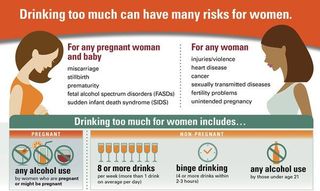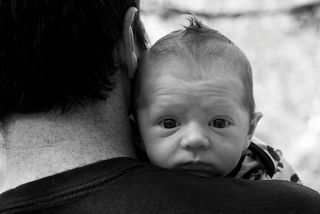Alcoholism
Hey CDC, You Forgot About Dads!
Protecting babies from alcohol exposure: not just women's job
Posted February 7, 2016

This post was authored by Hannah Lyden, Ph.D candidate at University of Southern California
The CDC recently recommended that sexually active women who are currently not on birth control should abstain from drinking to prevent alcohol exposure to their potential unborn children. The CDC stated “More than 3 million US women are at risk of exposing their developing baby to alcohol because they are drinking, having sex, and not using birth control to prevent pregnancy. About half of all US pregnancies are unplanned and, even if planned, most women do not know they are pregnant until they are 4-6 weeks into the pregnancy.” The announcement then goes on to list the things women can do to prevent alcohol exposure to their unborn fetuses. Some have criticized this message as sexist: it puts the onus specifically on women to protect future generations. As a parenting researcher, and specifically a fathering researcher, the glaring question in my mind is this: What about dads??
Why should we care about dads?
The role of the father has undergone significant change in the last few decades. We have only recently gone from a culture that promotes dads as bumbling idiots who can't put on a diaper or start a load of laundry, to a recognition that strong men can be caring fathers, as shown in this touching Super Bowl commercial. So what does this shift mean for men? What messages are men getting as they enter into parenting?
First of all, when do men become fathers? Is it the moment they find out their partner is pregnant? Is it when they first meet their child? Or are men as biologically determined to be parents as society thinks women are? This question is currently being explored in my research lab at USC. We are heading a longitudinal study, the Hormones Across the Transition to Childrearing (HATCH) study, in order to answer these fundamental questions of how and when a man becomes a father. Research suggests that the father has a fundamental and critical role in the development of children. Children with involved fathers show improvements in school readiness, physical health, social competence, resilience to psychopathology and economic and health outcomes throughout the lifespan. Particularly in industrialized societies, where we have abandoned the “it takes a village” mentality, and mostly rely on nuclear families to raise children, the father plays a major role in the development of our future generations.

What about dads and prenatal exposure to alcohol?
Returning to the CDC’s exhortation that women protect their progeny from alcohol exposure, where then does men’s responsibility lie? Yes, women have uteruses (uteri?) – but even though women provide the housing for our unborn children, they do not spontaneously impregnate themselves like asexual mushrooms. Men are responsible for half of the child’s DNA and half of the child’s environment, so why aren’t men being charged with this incredible public health obligation to shield children from alcohol exposure?
The research literature suggests that the role of the father begins even before the child enters the world. Father’s support during a women’s pregnancy reduces perinatal risks, such as preterm birth and low birth weight. Similarly, men’s and women’s hormones may link up, or co-regulate, before the birth of the child, and this linkage might predict better outcomes for the relationship and the child after birth.
A 2005 article, “Father involvement and fetal alcohol spectrum disorder (FASD): developing best practices” also suggests that the exclusion of fathers from the discussion of FASD has “minimized the concern of possible male-mediated effects” on FASD. For example, animal studies suggest that paternal alcohol exposure is also linked to physical malformations, increased adrenal weights at birth, and increased susceptibility of the immune system in newborns. Discounting the role of men in fetal exposure to alcohol in popular discourse has limited the research into this particular arena in humans. However, one study suggests that 75% of children born with FASD have biological fathers who are heavy drinkers and alcoholics, whereas other studies suggest lower rates (22%). And just so I make sure you guys are listening out there, alcohol is found to be a testicular toxin, which can cause loss of sperm and an increase of abnormal sperm. Where was the CDC’s recommendation about men’s drinking when planning a pregnancy? Or their contribution to unplanned pregnancies? Moreover, the act of fathering is not just the contribution of sperm, but also includes important relational investments that are critically vital for the child’s emotional, physical and psychological development. Men’s drinking may interfere with their family roles and compromise child health. For example, intimate partner violence in pregnancy is a major risk factor for fetal death, and alcohol abuse is known to increase risk for such violence. But can you imagine a CDC recommendation telling men not to drink because they might abuse their pregnant partners?

What do we do about it?
So what does all this science mean? It means that a man begins his transformation into fatherhood before the child is even born. Pregnancy is not just a women’s arena, and accidental pregnancies or fetal exposure to alcohol should not be the sole responsibility of women. Imagine a world where all men went to parties, or entered into a consensual sexual experiences thinking about how they might be able to protect their future children? How would things be different if the CDC suggested that women and men work together to protect future offspring from being exposed to alcohol, and what role men can play in preventing unwanted pregnancies? How about empowering women and men to be successful partners and parents? We should continue to promote the idea that being a man includes being a sensitive and caring father and partner. We can continue to fund important legislation that gives women and men access to birth control, as well as increase research into men’s birth control procedures. We can continue to think about empowering boys to consider their role as a potential father and the choices they may make for their future children. These questions go beyond the scope of preventing fetal alcohol exposure. They point to a gaping hole in popular discourse about fathers. The same can be seen in the conversation about preventing the Zika virus, by imploring women not to get pregnant and even to abstain from sex. However, last time we checked, men had something to do with pregnancy too. Fathers matter, now more than ever, and as the roles of caretakers are negotiated as societies’ ideas of fathering and mothering continue to change, it is vitally important that we don’t leave fathers out.
Sarkadi, A., Kristiansson, R., Oberklaid, F., & Bremberg, S. (2008). Fathers' involvement and children's developmental outcomes: A systematic review of longitudinal studies. Acta paediatrica, 97(2), 153-158.
Hahn-Holbrook, J., & Haselton, M. (2014). Is Postpartum Depression a Disease of Modern Civilization?. Current Directions in Psychological Science,23(6), 395-400.
Feldman, P. J., Dunkel-Schetter, C., Sandman, C. A., & Wadhwa, P. D. (2000). Maternal social support predicts birth weight and fetal growth in human pregnancy. Psychosomatic Medicine, 62(5), 715-725
Edelstein, R. S., Wardecker, B. M., Chopik, W. J., Moors, A. C., Shipman, E. L., & Lin, N. J. (2015). Prenatal hormones in first-time expectant parents: Longitudinal changes and within-couple correlations. American Journal of Human Biology, 27(3), 317-325
Gearing, R.E., McNeill, T.& Lozier, F. (2005). Father involvement and fetal alcohol spectrum disorder: Developing best practices. Journal of FAS International, 3(e14) 1-11.
Cicero TJ, Nock B, O'Connor LH, Sewing BN, Adams ML, Meyer ER (1994). Acute paternal alcohol exposure impairs fertility and fetal outcome. Life Sciences 55(2): 33-36
Tanaka H, Suzuki N, Arima M. (1982). Experimental studies on the influence of male alcoholism on fetal development. Brain & Development ,4(1):1-6.
Abel EL. (1983). Marijuana, Tobacco, Alcohol, and Reproduction. Boca Raton, FL: CRC PresS.
Cicero TJ. (1994). Effects of paternal exposure to alcohol on offspring development. Alcohol Health & Research World, 18(1), 37-41
Passaro KT, Little RE, Savitz DA, Noss J (1998). Effect of paternal alcohol consumption before conception on infant birth weight. ALSPAC Study Team. Avon Longitudinal Study of Pregnancy and Childhood. Teratology ; 57(6):294-301.
McGue M. (1999). The Behavioral Genetics of Alcoholism. Current Directions in Psychological Science, 8(4),109-114.




